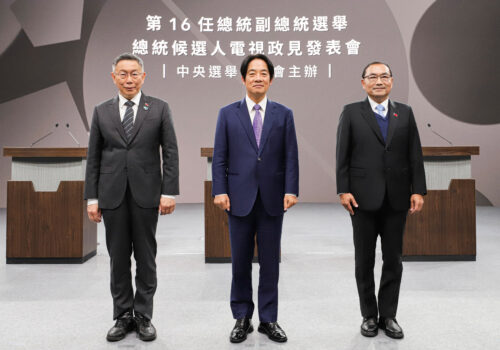It’s time for a US-Taiwan free trade agreement
Earlier this month, the people of Taiwan elected Lai Ching-te of the Democratic Progressive Party (DPP) as their new president. During the campaign, Lai consistently stressed the importance of Taiwan maintaining democracy and freedom, bolstering the island’s defenses, and strengthening its relationship with like-minded nations to reduce its economic dependence on the People’s Republic of China (PRC). Indeed, this substantial economic dependence was laid bare in the run-up to the election, when the PRC imposed trade restrictions on a range of Taiwanese exports in an attempt to influence the election’s outcome.
By electing the DPP to an unprecedented third term in the presidency, the Taiwanese people have made clear that they share many core US values and want to continue to follow the DPP’s path in expanding Taiwan’s relationship with the United States. It is therefore incumbent upon the United States to answer the call and do everything it can to help Taiwan preserve the status quo of stability in the Taiwan Strait.
Core to these efforts is continued military support, such as clearing the backlog of foreign military sales to Taiwan and increasing US hard power in the Indo-Pacific. But it has become increasingly clear that an effective strategy to protect Taiwan from a PRC invasion must also include a strong economic component.
A robust economic strategy to support Taiwan is critical because any potential effort by the PRC to take over the island is unlikely to only include troops, tanks, and ships. As a complement to any military action, the PRC will also try to sap Taiwan’s resources and its will to fight through an economic embargo or similar form of economic strangulation.
At present, Taiwan is uniquely susceptible to Chinese economic coercion. Mainland China and Hong Kong are the number one export and import markets for Taiwan. They accounted for 35.2 percent of Taiwan’s exports and 20.3 percent of Taiwan’s imports last year, according to data from the Taiwan’s Customs Administration. As a result of the heavy concentration of Taiwanese trade with China and Hong Kong, the PRC could shut down a significant portion of Taiwan’s trade flows and cripple key segments of its economy.
A comprehensive FTA can help Taiwan diversify its outbound and inbound trade flows away from China and toward the United States.
To help protect Taiwan from economic coercion by the PRC, the United States should pursue a free trade agreement (FTA) with the island. A comprehensive FTA can help Taiwan diversify its outbound and inbound trade flows away from China and toward the United States by reducing tariffs on trade in goods, promoting cross-border investment and services, and aligning a regulatory approach across a broad range of sectors.
An FTA between the United States and Taiwan would also help Taiwan expand its trade with the rest of the world. As Taiwanese Foreign Minister Joseph Wu has noted, if the United States initiated FTA negotiations with Taiwan, it would send a strong signal to others that they should do the same. The United States and its allies could even announce matching intentions at the same time, including inviting Taiwan to join ongoing regional trade initiatives. In sum, this would ensure that Taiwan’s trade is less concentrated on China, and much more dispersed among the United States and like-minded allies around the world.
Equally important, a US-Taiwan FTA would create significant economic benefits for the United States. US farmers have long sought to penetrate the Taiwanese market for a broad range of American products such as beef and pork. Taiwanese tariffs on agricultural goods, which are three times as high as those in the United States, have served as a barrier to more agricultural trade, as have behind-the-border measures that could be addressed in an FTA negotiation. Other benefits to the United States could include expanding digital trade, increasing financial services exports, and closely aligning supply chains on a range of critical technologies, such as semiconductors.
US policymakers should be commended for taking some small steps in this direction. In June 2023, the Biden administration and Taiwan signed a small deal on customs and regulatory issues under the US-Taiwan Initiative on Twenty-First Century Trade, and the United States and Taiwan are pursuing other deliverables. However, these negotiations are limited in scope and do not include key elements, such as market access provisions, that would proactively boost trade between the United States and Taiwan or explicitly link their supply chains. Likewise, Congress is working on legislation that would eliminate double taxation between the two economies.
Taiwan has long been in favor of an FTA with the United States, but US policymakers have been reluctant to take this step, in part due to concern that it would disrupt the United States’ relationship with China. However, times have changed, and US policy must change with it. The Trump administration completely recalibrated the US-China trade relationship, with most of these policies continued by the Biden administration. It is time that the United States similarly rethink its trade relationship with Taiwan, especially in light of the PRC’s growing saber-rattling toward the island.
During the campaign, Lai stated that Taiwan’s “[t]rade dependencies toward China have created vulnerabilities that can be exploited through economic coercion,” and therefore Taiwan “must foster secure supply chains while pursuing trade agreements that encourage trade diversification.” The United States must heed the Taiwanese president-elect’s call for support. It must move past half measures toward a truly comprehensive US-Taiwan FTA.
Clete Willems is a senior fellow at Atlantic Council’s GeoEconomics Center, a partner at Akin Gump Strauss Hauer & Feld, and the former deputy assistant to the US president for international economics (2018-2019).
Further reading
Mon, Jan 22, 2024
Lai’s victory isn’t the full story. Here are five deeper takeaways from Taiwan’s election.
New Atlanticist By Lev Nachman, Wen-Ti Sung
The January 13 election in Taiwan revealed which political parties hold the strongest hands, what’s next for the legislature, and how China might respond.
Sat, Jan 13, 2024
Beijing’s least favorite candidate wins Taiwan’s presidential election
Fast Thinking By
From Taipei to Washington, our experts weigh in on the implications of Lai's presidential election victory.
Wed, Jan 3, 2024
Why Beijing’s latest pre-election attempt to coerce Taiwanese voters could backfire
New Atlanticist By Lev Nachman, Wen-Ti Sung
China recently said that it would end preferential tariff terms for some Taiwanese chemical exports. But the move may drive some Taiwanese voters away from the direction Beijing wants.
Image: Container ships are seen at the port in Keelung, Taiwan August 6, 2022. REUTERS/Jameson Wu


